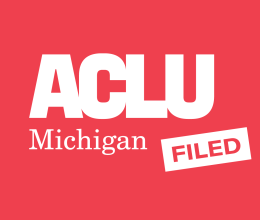
Residents at more than 112,000 Detroit households had their water disconnected between 2014 and October 2018, simply because they couldn’t afford to pay.
Today a civil rights coalition filed a petition with the Michigan Department of Health and Human Services (MDHHS), urging the state agency to require the Detroit Water and Sewerage Department (DWSD) to suspend water shutoffs to avoid a public health emergency. Denying Detroit residents access to water can pose a public health hazard, according to studies cited in today’s filing.
“The public health crisis DWSD creates by shutting off water service for thousands of people is completely avoidable,” said Mark P. Fancher, staff attorney for the ACLU of Michigan’s Racial Justice Project. “If they simply agreed to adopt a plan that makes water affordable for even the poorest customers, mass water shutoffs and the dangerous conditions they create would not occur.”
While the petition specifically cites studies and reports that warn of potential disease epidemics and mass contagion, it also cites health issues that are occurring because of the loss of water services.
These include:
- Low infant weight resulting from inability to prepare baby formula;
- Elevated blood pressure brought on by the stress of not having water;
- Illnesses resulting from consumption of rain water from barrels;
- Diabetics who suffer complications because of the inability to prepare meals with clean water;
- Chronic urinary tract infections among women and children;
- Upper respiratory illnesses; and
- Chronic and infected eczema and other skin disorders.
After years of research, advocacy and litigation, the coalition’s petition is the latest effort to end mass water shutoffs that are often prompted by, among other things, inaccurate billing, and water rates that do not reflect the economic realities of low-income customers. DWSD has also been unwilling to adopt a water affordability plan for low-income residents.
“An affordability plan could be a win-win for the city utility and low-income customers,” said attorney Alice Jennings, founding partner of Edwards & Jennings, P.C. “DWSD would receive payments from customers who were unable to pay rates they were charged in the past, and the need for shutoffs would be drastically reduced if not eliminated.”
“By shutting off water to people who can’t afford to pay, Detroit is prioritizing affluent residents,” said Jerome Goldberg, attorney with Moratorium Now. “We hope that the Michigan Department of Health and Human Services values the health and quality of life of all residents and forces Detroit to suspend water shut offs.”
“Every resident in Detroit has a right to clean water, regardless of their income,” said Anthony Adams, former City of Detroit Deputy Mayor, Interim Director of Detroit Water and Sewerage Department, and now founding partner of Marine-Adams Law, P.C. “In a major city like Detroit, it is unacceptable for the city to deny residents an affordable water rate and create a potential public health emergency by shutting off water.”